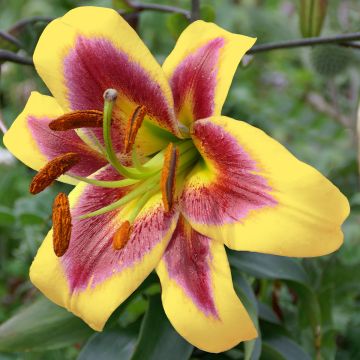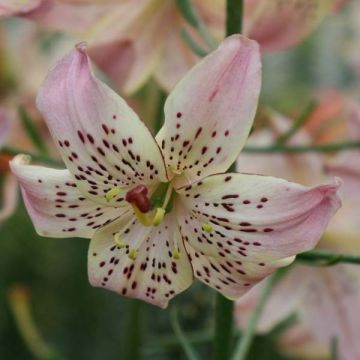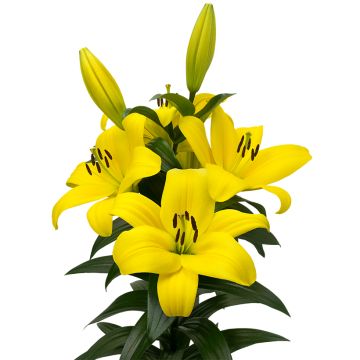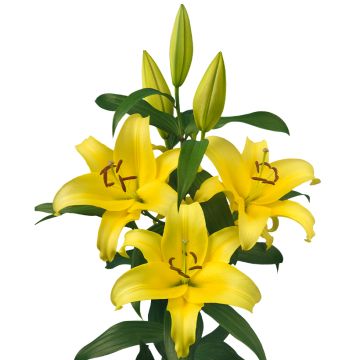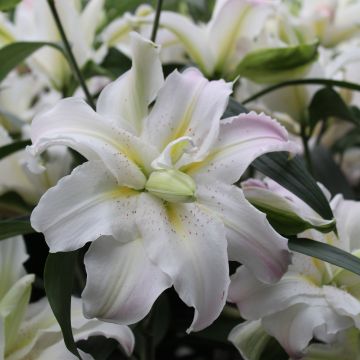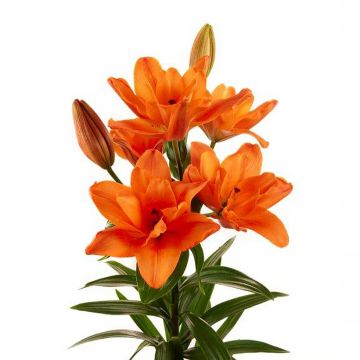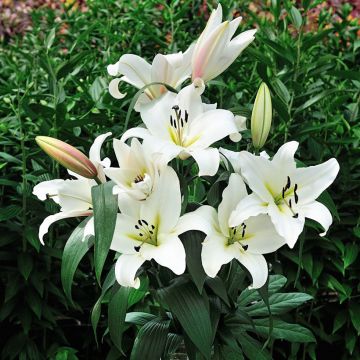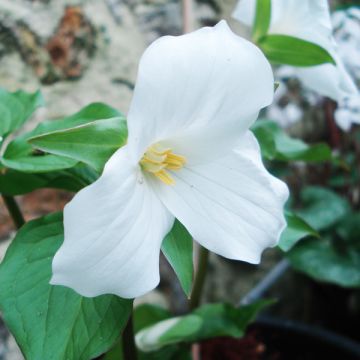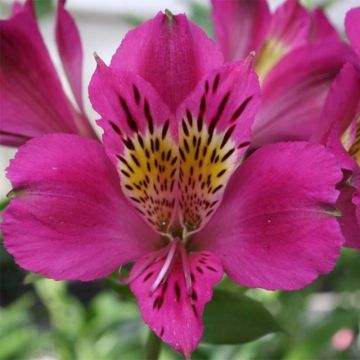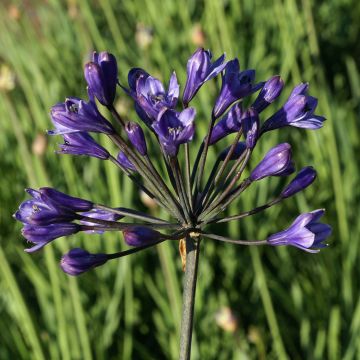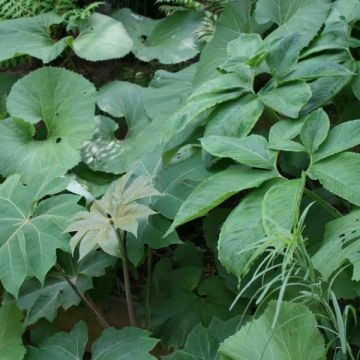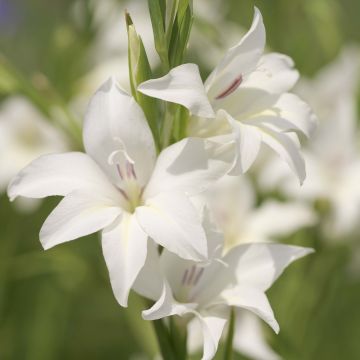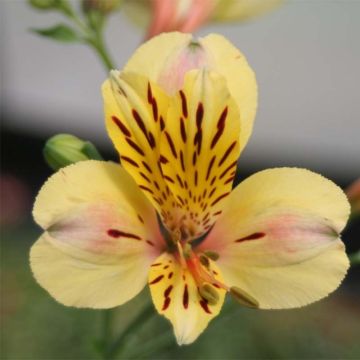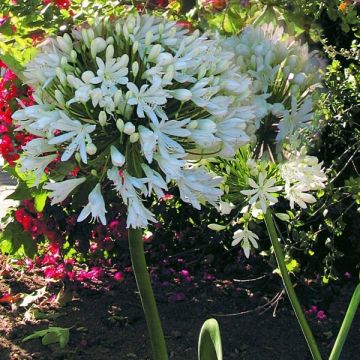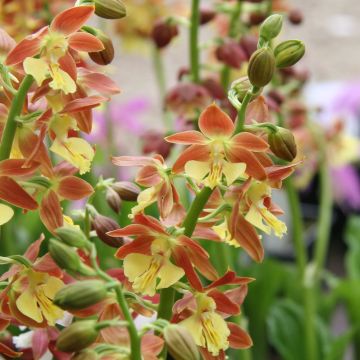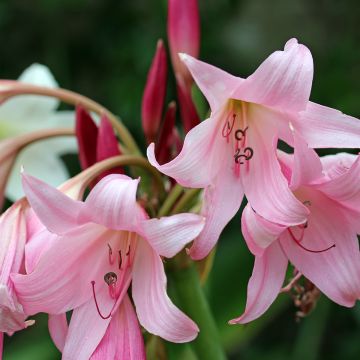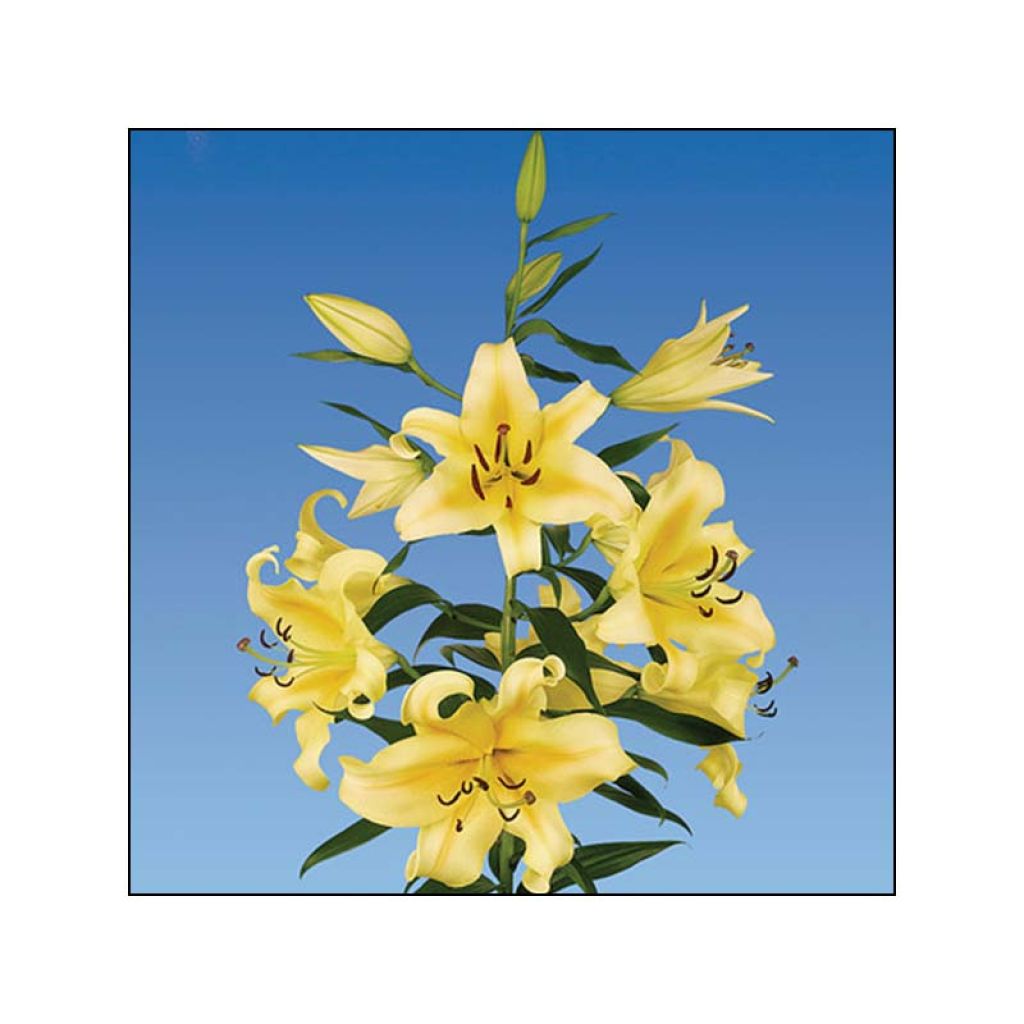

Lis géant Honeymoon (Oriental/Trompette)
Lilium Honeymoon - Lily
Lilium x OT Honeymoon
Hybrid Lily
This item cannot be shipped to the selected country
Delivery charge from €5.90
More information
Schedule delivery date,
and select date in basket
This plant carries a 6 months recovery warranty
More information
We guarantee the quality of our plants for a full growing cycle, and will replace at our expense any plant that fails to recover under normal climatic and planting conditions.
From €5.90 for pickup delivery and €6.90 for home delivery
Express home delivery from €8.90.

Does this plant fit my garden?
Set up your Plantfit profile →
Description
Lilium 'Honeymoon' is part of a fabulous lineage of hybrid lilies between oriental and trumpet lilies. It has retained the fragrance of the former with a colour that is only found in the latter. This spectacular variety has a very large bulb that will produce a floral stem that can bear up to 30 immense, very wide open flowers in the second half of summer. The brightness of the colour, a delicate combination of cream and yellow, is enhanced by the curve of the flower. It is a magnificent garden plant that will improve year after year, in very well-drained and limestone-free soil. Its giant floral stem is so strong that it does not need staking.
The genus Lilium belongs to the family Liliaceae. 'Honeymoon', introduced in 2004 in the Netherlands, is part of a horticultural category called O/T Group. It can easily reach 2m (7ft) high and 50 cm (20in) wide when grown under optimal conditions and after 3 or 4 years of cultivation. This hybrid sometimes takes a little time to establish itself, but it proves vigorous and hardy over the years in very well-drained soil, rather dry in winter. It begins flowering in mid-July and lasts until mid-August depending on the climate. Over several weeks, up to 30 buds will open on a mature plant. The flowers measure 15 to 30 cm (6 to 12in) in diameter and are very pleasantly scented in the evening. The flower consists of 6 long petals beautifully recurved at their ends and wavy along the edges. The petals are pale yellow on the outside and cream-coloured on the border and ends. The throat of the flower is a bright lemon yellow. There are no dots on the petals. The throat is filled with long green stamens with reddish-brown pollen and purple stigmas. The large, dark green leaves are 18 cm (7in) long and 3 cm (1in) wide. Their leathery texture tends to deter lily beetles. The vegetation of the lilies disappears in winter and emerges from the ground in late spring.
This plant prefers rich humus soil and does not like chalky and poorly drained soil, as its bulb is sensitive to winter moisture. You can cover the base with an impermeable film or a thick mulch in winter, this technique is effective but not very aesthetic. The flowers will last longer and their colour will be preserved if the plant is somewhat shaded in the afternoon. You can associate the Lilium 'Honeymoon' with white lilies (Lilium regale Album, Lilium speciosum Album), orange lilies (Double Apricot Fudge Lily), grasses and perennial plants, as it enjoys having its feet in the shade. These will also help prevent the stems from tipping over in the wind and rain. The lily is perfect on the edge of a grove, with low shrubs (small rhododendrons, azaleas, Rosa rugosa, Gardenia Kleim's Hardy), and of course in bouquets.
Report an error about the product description
Lilium Honeymoon - Lily in pictures
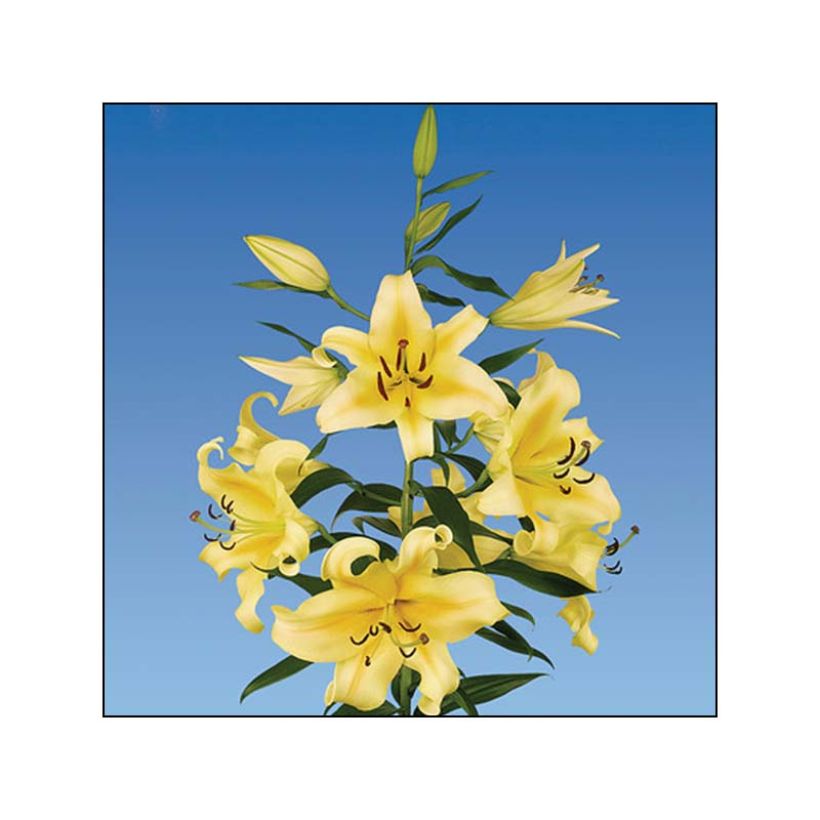

Plant habit
Flowering
Foliage
Botanical data
Lilium
x OT
Honeymoon
Liliaceae
Hybrid Lily
Cultivar or hybrid
Other Hybrid Lilies
Planting and care
Lilium Honeymoon thrives in humus-rich soil and does not tolerate chalky and poorly drained soils as its bulb hates excess moisture in winter. You can put an impermeable film over the crown in winter to protect it from excessive rainfall. Ideally, the bulbs should be planted in October or in spring, 15 cm (6in) deep in a mixture of soil and leaf compost. If planted in a too shady location, it will tend to elongate. To keep the stems strong, choose an open area with a sunny but not scorching exposure. Surround the bulbs with a layer of sand to prevent rot and attacks from slugs, while allowing them to grow more easily. Mark the planting location, as vegetation only starts in March-April. Protect young shoots from frost in case of severe cold. If red lily beetles appear, treat them immediately, as their larvae can devour all the leaves. The most effective method is to catch them by hand, but be careful as they drop as soon as they are touched. After flowering, it is a good idea to cut the faded flowers halfway to keep the beds beautiful during the summer. The bulbs of this lily multiply quickly and can be divided every 3 or 4 years. If you prefer not to divide the clumps after four years, the tightly packed cluster of bulbs will produce numerous, shorter stems with fewer flowers per stem and the plant will resemble a bushy shrub. To obtain 2-metre (7 feet) stems with 30 to 40 buds each, you must divide the bulbs.
Tip for planting lilies in compact soil: The scaly bulbs of large lilies are not fond of clay soils that suffocate them and cause rot. In Eastern Europe, the following technique is used to help these bulbs survive the winter. Plant them on 'benches' built above ground level. These benches consist of a layer of gravel, on which tightly packed branches are placed. Then cover everything with a thick layer of 20 to 30 cm (8 to 12in) of compost. Plant the bulbs in the compost, on which a few ground-cover plants can also crawl.
On the terrace, you can create sumptuous pots with lilies. Choose a container that is large and deep enough (at least 16 cm (6in) in diameter for 1 bulb). Fill it with a mixture of leaf compost and sand. Plant the lilies in groups of 3 to 5 bulbs, 10-15 cm (4-6in) apart, then water generously. Place the pots in a cool room or outside once the frosts have passed. The ambient temperature should be around 12°C (53.6°F). When shoots appear, move the pot to a conservatory or a very bright room, at a temperature of around 18°C (64.4°F). Apply liquid fertiliser twice a month until the appearance of flower buds.
Planting period
Intended location
Care
-
, onOrder confirmed
Reply from on Promesse de fleurs
Hardy summer bulbs
Haven't found what you were looking for?
Hardiness is the lowest winter temperature a plant can endure without suffering serious damage or even dying. However, hardiness is affected by location (a sheltered area, such as a patio), protection (winter cover) and soil type (hardiness is improved by well-drained soil).

Photo Sharing Terms & Conditions
In order to encourage gardeners to interact and share their experiences, Promesse de fleurs offers various media enabling content to be uploaded onto its Site - in particular via the ‘Photo sharing’ module.
The User agrees to refrain from:
- Posting any content that is illegal, prejudicial, insulting, racist, inciteful to hatred, revisionist, contrary to public decency, that infringes on privacy or on the privacy rights of third parties, in particular the publicity rights of persons and goods, intellectual property rights, or the right to privacy.
- Submitting content on behalf of a third party;
- Impersonate the identity of a third party and/or publish any personal information about a third party;
In general, the User undertakes to refrain from any unethical behaviour.
All Content (in particular text, comments, files, images, photos, videos, creative works, etc.), which may be subject to property or intellectual property rights, image or other private rights, shall remain the property of the User, subject to the limited rights granted by the terms of the licence granted by Promesse de fleurs as stated below. Users are at liberty to publish or not to publish such Content on the Site, notably via the ‘Photo Sharing’ facility, and accept that this Content shall be made public and freely accessible, notably on the Internet.
Users further acknowledge, undertake to have ,and guarantee that they hold all necessary rights and permissions to publish such material on the Site, in particular with regard to the legislation in force pertaining to any privacy, property, intellectual property, image, or contractual rights, or rights of any other nature. By publishing such Content on the Site, Users acknowledge accepting full liability as publishers of the Content within the meaning of the law, and grant Promesse de fleurs, free of charge, an inclusive, worldwide licence for the said Content for the entire duration of its publication, including all reproduction, representation, up/downloading, displaying, performing, transmission, and storage rights.
Users also grant permission for their name to be linked to the Content and accept that this link may not always be made available.
By engaging in posting material, Users consent to their Content becoming automatically accessible on the Internet, in particular on other sites and/or blogs and/or web pages of the Promesse de fleurs site, including in particular social pages and the Promesse de fleurs catalogue.
Users may secure the removal of entrusted content free of charge by issuing a simple request via our contact form.
The flowering period indicated on our website applies to countries and regions located in USDA zone 8 (France, the United Kingdom, Ireland, the Netherlands, etc.)
It will vary according to where you live:
- In zones 9 to 10 (Italy, Spain, Greece, etc.), flowering will occur about 2 to 4 weeks earlier.
- In zones 6 to 7 (Germany, Poland, Slovenia, and lower mountainous regions), flowering will be delayed by 2 to 3 weeks.
- In zone 5 (Central Europe, Scandinavia), blooming will be delayed by 3 to 5 weeks.
In temperate climates, pruning of spring-flowering shrubs (forsythia, spireas, etc.) should be done just after flowering.
Pruning of summer-flowering shrubs (Indian Lilac, Perovskia, etc.) can be done in winter or spring.
In cold regions as well as with frost-sensitive plants, avoid pruning too early when severe frosts may still occur.
The planting period indicated on our website applies to countries and regions located in USDA zone 8 (France, United Kingdom, Ireland, Netherlands).
It will vary according to where you live:
- In Mediterranean zones (Marseille, Madrid, Milan, etc.), autumn and winter are the best planting periods.
- In continental zones (Strasbourg, Munich, Vienna, etc.), delay planting by 2 to 3 weeks in spring and bring it forward by 2 to 4 weeks in autumn.
- In mountainous regions (the Alps, Pyrenees, Carpathians, etc.), it is best to plant in late spring (May-June) or late summer (August-September).
The harvesting period indicated on our website applies to countries and regions in USDA zone 8 (France, England, Ireland, the Netherlands).
In colder areas (Scandinavia, Poland, Austria...) fruit and vegetable harvests are likely to be delayed by 3-4 weeks.
In warmer areas (Italy, Spain, Greece, etc.), harvesting will probably take place earlier, depending on weather conditions.
The sowing periods indicated on our website apply to countries and regions within USDA Zone 8 (France, UK, Ireland, Netherlands).
In colder areas (Scandinavia, Poland, Austria...), delay any outdoor sowing by 3-4 weeks, or sow under glass.
In warmer climes (Italy, Spain, Greece, etc.), bring outdoor sowing forward by a few weeks.

































